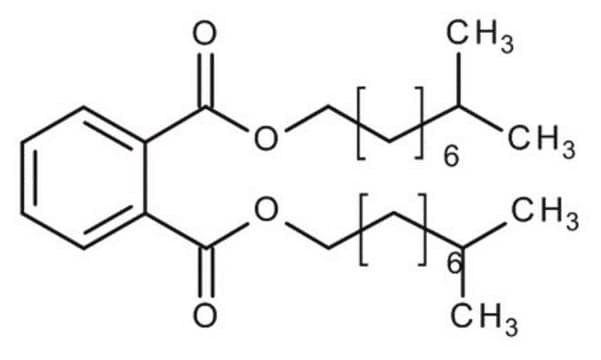Fontos dokumentumok
80135
Diisodecyl phthalate
Selectophore™, ≥99.0%
About This Item
Javasolt termékek
grade
for ion-selective electrodes
Minőségi szint
termékcsalád
Selectophore™
Teszt
≥99.0% (sum of isomers, GC)
≥99.0%
form
liquid
törésmutató
n20/D 1.486
sűrűség
0.965 g/mL at 20 °C (lit.)
SMILES string
O=C(OCCCCCCCC(C)C)C1=C(C(OCCCCCCCC(C)C)=O)C=CC=C1
InChI
1S/C28H46O4/c1-23(2)17-11-7-5-9-15-21-31-27(29)25-19-13-14-20-26(25)28(30)32-22-16-10-6-8-12-18-24(3)4/h13-14,19-20,23-24H,5-12,15-18,21-22H2,1-4H3
Nemzetközi kémiai azonosító kulcs
ZVFDTKUVRCTHQE-UHFFFAOYSA-N
Looking for similar products? Látogasson el ide Útmutató a termékösszehasonlításhoz
Related Categories
Általános leírás
Alkalmazás
Jogi információk
Figyelmeztető mondatok
Óvintézkedésre vonatkozó mondatok
Veszélyességi osztályok
Aquatic Chronic 4
Tárolási osztály kódja
10 - Combustible liquids
WGK
WGK 1
Lobbanási pont (F)
527.0 °F - closed cup
Lobbanási pont (C)
275.00 °C - closed cup
Egyéni védőeszköz
Eyeshields, Gloves
Válasszon a legfrissebb verziók közül:
Már rendelkezik ezzel a termékkel?
Az Ön által nemrégiben megvásárolt termékekre vonatkozó dokumentumokat a Dokumentumtárban találja.
Az ügyfelek ezeket is megtekintették
Tudóscsoportunk valamennyi kutatási területen rendelkezik tapasztalattal, beleértve az élettudományt, az anyagtudományt, a kémiai szintézist, a kromatográfiát, az analitikát és még sok más területet.
Lépjen kapcsolatba a szaktanácsadással







